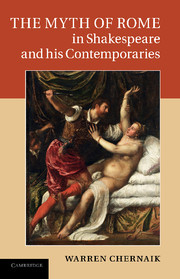Book contents
- Frontmatter
- Contents
- Acknowledgements
- Introduction: a Roman thought
- 1 Roman historians and the myth of Rome
- 2 The wronged Lucretia and the early republic
- 3 Self-inflicted wounds
- 4 ‘Like a Colossus’: Julius Caesar
- 5 Ben Jonson's Rome
- 6 O'erflowing the measure: Antony and Cleopatra
- 7 The city and the battlefield: Coriolanus
- 8 Tyranny and empire
- 9 Ancient Britons and Romans
- Postscript: Shakespeare and the republican tradition
- Notes
- Bibliography
- Index
7 - The city and the battlefield: Coriolanus
Published online by Cambridge University Press: 29 March 2011
- Frontmatter
- Contents
- Acknowledgements
- Introduction: a Roman thought
- 1 Roman historians and the myth of Rome
- 2 The wronged Lucretia and the early republic
- 3 Self-inflicted wounds
- 4 ‘Like a Colossus’: Julius Caesar
- 5 Ben Jonson's Rome
- 6 O'erflowing the measure: Antony and Cleopatra
- 7 The city and the battlefield: Coriolanus
- 8 Tyranny and empire
- 9 Ancient Britons and Romans
- Postscript: Shakespeare and the republican tradition
- Notes
- Bibliography
- Index
Summary
‘I BANISH YOU’: A HERO'S ROME
No play by Shakespeare is more obsessively concerned with Roman values, or more critical of these values, than Coriolanus. The words ‘Rome’ and ‘Roman’ recur more times in Coriolanus than in any Shakespeare play other than Titus Andronicus – eighty-eight for ‘Rome’, twenty-two for ‘Roman’. The terms are sometimes used in a ceremonial way, as in the Herald's speech in 2.1 honouring Coriolanus with his newly won title:
herald. Know, Rome, that all alone Martius did fight
Within Corioles' gates …
Welcome to Rome, renowned Coriolanus!
(2.1.158–9, 162)In the early republic, citizens were expected to serve Rome on the battlefield, demonstrating their patriotism by the wounds they have endured. Cominius, who at one point says ‘I have been consul, and can show for Rome /Her enemies’ marks upon me', praises Martius, emerging from the battlefield covered in blood: ‘We thank the gods /Our Rome has such a soldier … /Rome must know /The value of her own’ (1.10.8–9, 20–21; 3.3.111–12). In praising ‘the deeds of Coriolanus’, Cominius identifies ‘valour’, martial courage, as the primary virtue:
It is held
That valour is the chiefest virtue, and
Most dignifies the bearer. If it be,
The man I speak of cannot in the world
Be singly counterpoised.
(2.2.80–5)At the beginning of Plutarch's ‘Life of Caius Martius Coriolanus’, Martius is presented as exemplifying the equation of virtus with manly courage in the early republic:
Now in those dayes, valiantnes was honoured in Rome above all other vertues: which they called virtus, by the name of vertue it selfe, as including in that generall name, all other special vertues besides. […]
- Type
- Chapter
- Information
- The Myth of Rome in Shakespeare and his Contemporaries , pp. 165 - 195Publisher: Cambridge University PressPrint publication year: 2011



